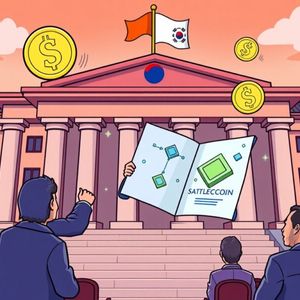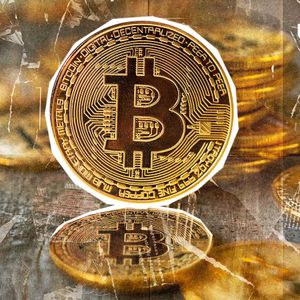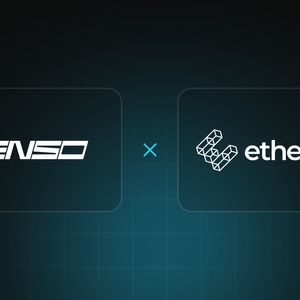South Korea Stablecoin Bill: A Pioneering Leap for Digital Asset Regulation
8 min read
BitcoinWorld South Korea Stablecoin Bill: A Pioneering Leap for Digital Asset Regulation Imagine a world where digital currencies, specifically stablecoins, operate within a clear, robust regulatory framework, ensuring stability and protecting users. For South Korea, this vision is rapidly becoming a reality. The nation is on the cusp of a significant legislative shift, as the Democratic Party of Korea (DPK) prepares to propose the country’s first comprehensive South Korea stablecoin bill . This pivotal move signals a growing global trend towards legitimizing and integrating digital assets into traditional financial systems, promising a new era of clarity and security for the crypto landscape. What is the South Korea Stablecoin Bill All About? At its core, the upcoming South Korea stablecoin bill , spearheaded by DPK lawmaker Ahn Do-geol, aims to establish a clear regulatory pathway for stablecoins pegged to the Korean Won. Unlike previous, broader digital asset proposals, Ahn’s bill is specifically designed to address the unique characteristics and challenges of value-stable digital assets. It’s a targeted approach, focusing on: Issuance: Defining who can issue Korean Won-pegged stablecoins and under what conditions. This will likely involve strict requirements for reserves and auditing to ensure the stablecoin maintains its peg. Circulation: Regulating how these stablecoins are traded, transferred, and used within the South Korean economy. This could cover aspects like anti-money laundering (AML) and know-your-customer (KYC) compliance. Oversight: Establishing a framework for government bodies to monitor and supervise stablecoin operations, ensuring compliance and market integrity. While DPK lawmaker Min Byeong-dug introduced a broader basic digital asset act last month that touched upon stablecoins, Ahn’s proposal, set for July 28, is poised to be the first dedicated and comprehensive piece of legislation. Furthermore, there’s anticipation that Kim Eun-hye of the opposition People Power Party (PPP) will also introduce a similar bill, highlighting a bipartisan recognition of the urgent need for stablecoin regulation. Why is This South Korea Stablecoin Bill a Game Changer? The introduction of a dedicated South Korea stablecoin bill is more than just another piece of legislation; it’s a transformative step for several reasons: 1. Enhancing Consumer Protection: The primary driver behind this regulation is likely the protection of investors and users. By mandating transparent reserves and robust oversight, the bill aims to prevent scenarios akin to the Terra-Luna collapse, where a lack of regulation led to significant financial losses. This will foster greater trust in stablecoins and the broader digital asset ecosystem. 2. Fostering Financial Stability: Stablecoins, by their nature, aim to bridge the gap between volatile cryptocurrencies and traditional fiat currencies. Unregulated stablecoins, however, can pose systemic risks if their reserves are not properly managed. This bill seeks to integrate stablecoins safely into the financial system, mitigating potential risks to national financial stability. 3. Promoting Innovation with Clarity: While regulation might sometimes be perceived as a hindrance, a clear regulatory framework can actually spur innovation. By providing legal certainty, businesses and developers will have a clearer understanding of the rules, encouraging them to build new services and applications utilizing Korean Won-pegged stablecoins without fear of sudden regulatory shifts. 4. Boosting Global Competitiveness: As nations worldwide grapple with crypto regulation, South Korea’s proactive stance with a dedicated South Korea stablecoin bill positions it as a leader in responsible digital asset adoption. This could attract foreign investment and foster a vibrant domestic blockchain industry, enhancing the country’s competitiveness in the global digital economy. Who Are the Key Players Behind the South Korea Stablecoin Bill ? The legislative landscape for digital assets in South Korea is dynamic, with several key figures championing different approaches: Ahn Do-geol (DPK): The primary sponsor of the upcoming comprehensive South Korea stablecoin bill . As a member of the National Assembly’s Strategy and Finance Committee, his proposal is expected to be detailed and impactful, focusing specifically on Won-pegged stablecoins. His focus on issuance, circulation, and oversight suggests a thorough understanding of the stablecoin mechanism. Min Byeong-dug (DPK): Introduced a broader basic digital asset act last month. While his bill included references to stablecoins, it was more general in scope, aiming to lay foundational rules for the entire digital asset market. Ahn’s bill can be seen as a more specialized follow-up to this broader framework. Kim Eun-hye (PPP): A member of the opposition People Power Party, Kim Eun-hye is also anticipated to propose a similar bill this week. The potential for bipartisan consensus on stablecoin regulation underscores the perceived urgency and importance of the issue across the political spectrum in South Korea. This collaboration could lead to more robust and widely accepted legislation. The interplay between these lawmakers and their respective proposals highlights a concerted effort within South Korea’s political arena to address the burgeoning digital asset market with careful consideration. What Challenges and Opportunities Does the South Korea Stablecoin Bill Present? Every significant regulatory move comes with its own set of challenges and opportunities. The proposed South Korea stablecoin bill is no exception: Challenges: Balancing Innovation and Regulation: A key challenge will be striking the right balance. Overly stringent regulations could stifle innovation and push crypto activities underground or offshore. The bill needs to be robust enough to protect, but flexible enough to allow growth. Defining “Stable”: The concept of stability in the digital asset world can be complex. The bill will need clear definitions for what constitutes a “stable” asset and how its peg is maintained and verified. Enforcement and Resources: Implementing and enforcing new regulations will require significant resources and expertise from regulatory bodies. Ensuring they have the tools and knowledge to oversee a rapidly evolving sector is crucial. Cross-Border Implications: Stablecoins operate globally. The bill will need to consider how it interacts with international regulations and how to prevent regulatory arbitrage. Opportunities: Increased Institutional Adoption: Regulatory clarity often paves the way for greater institutional participation. Banks, financial institutions, and large corporations may be more willing to engage with stablecoins once a clear legal framework is in place. New Business Models: The bill could enable new business models built on regulated stablecoins, such as streamlined international remittances, enhanced payment systems, and innovative financial products. Investor Confidence: A regulated environment will undoubtedly boost investor confidence, attracting more retail and institutional capital into the South Korean digital asset market. Global Leadership: By setting a precedent for comprehensive stablecoin regulation, South Korea could become a model for other nations looking to integrate digital assets responsibly. How Does the South Korea Stablecoin Bill Compare Globally? South Korea’s move is part of a broader global trend towards stablecoin regulation. Here’s how it stacks up against other major jurisdictions: Jurisdiction Regulatory Approach to Stablecoins Key Highlights South Korea Targeted, comprehensive bill for Won-pegged stablecoins. Focus on issuance, circulation, and oversight. Aim to protect consumers and foster financial stability. United States Fragmented, ongoing discussions. Various proposals (e.g., Lummis-Gillibrand bill, Treasury reports). SEC and CFTC vie for oversight. Emphasis on reserve requirements and systemic risk. European Union MiCA (Markets in Crypto-Assets) regulation. Comprehensive framework covering all crypto assets, including stablecoins. Strict rules for e-money tokens (EMT) and asset-referenced tokens (ART), focusing on reserves, governance, and consumer protection. United Kingdom Integrating stablecoins into existing financial regulations. Consultations to bring stablecoins under the Electronic Money Regulations and Payment Systems Regulations. Focus on systemic stablecoins. While different jurisdictions have varying speeds and approaches, the common thread is a recognition of stablecoins’ potential and the necessity for robust regulation to manage associated risks. South Korea’s specific focus on Won-pegged stablecoins highlights a national interest in controlling the digital representation of its own currency. What’s Next for the South Korea Stablecoin Bill ? The journey for the South Korea stablecoin bill is just beginning. Once proposed, it will undergo a rigorous legislative process, including committee reviews, public hearings, and votes in the National Assembly. This process allows for amendments and ensures that various stakeholders’ perspectives are considered. For individuals and businesses involved in the South Korean crypto space, staying informed will be paramount. Monitoring the legislative developments, understanding the implications of the proposed regulations, and preparing for compliance will be crucial. This bill has the potential to reshape how stablecoins are perceived and utilized in one of Asia’s most technologically advanced nations. Conclusion: A New Horizon for Digital Assets The impending proposal of South Korea’s first comprehensive South Korea stablecoin bill marks a significant milestone in the global journey towards responsible digital asset integration. By focusing on the issuance, circulation, and oversight of Korean Won-pegged stablecoins, lawmakers aim to establish a framework that protects consumers, enhances financial stability, and fosters innovation within a clear regulatory environment. This pioneering legislative effort positions South Korea as a key player in shaping the future of digital finance, offering a beacon of clarity in an often-unpredictable market. As the world watches, South Korea’s commitment to thoughtful regulation could very well set a new standard for how nations embrace the transformative potential of stablecoins. Frequently Asked Questions (FAQs) Q1: What exactly is a stablecoin? A stablecoin is a type of cryptocurrency designed to maintain a stable value, usually pegged to a fiat currency like the US Dollar or Korean Won, or to a commodity like gold. This stability is typically achieved by holding an equivalent amount of reserves in traditional assets. Q2: Why is South Korea focusing on regulating stablecoins now? South Korea is focusing on stablecoin regulation to enhance consumer protection, prevent financial instability, and provide legal clarity for businesses. Recent events in the crypto market have highlighted the risks associated with unregulated stablecoins, prompting a proactive legislative response. Q3: How does Ahn Do-geol’s stablecoin bill differ from Min Byeong-dug’s broader digital asset act? Min Byeong-dug’s act is a more general framework for all digital assets, including some references to stablecoins. Ahn Do-geol’s bill, however, is specifically and comprehensively dedicated to the issuance, circulation, and oversight of Korean Won-pegged stablecoins, making it the first of its kind in South Korea. Q4: How will this South Korea stablecoin bill impact cryptocurrency users and businesses in South Korea? For users, the bill is expected to increase trust and safety when dealing with Won-pegged stablecoins due to enhanced consumer protection and transparent reserve requirements. For businesses, it will provide regulatory clarity, potentially leading to increased institutional adoption and the development of new, compliant stablecoin-based services. Q5: Will this bill affect global stablecoin projects like USDT or USDC in South Korea? While Ahn Do-geol’s bill primarily focuses on Korean Won-pegged stablecoins, it sets a precedent for how South Korea views and regulates stable assets. It may influence future regulations concerning foreign-pegged stablecoins or prompt their issuers to seek local compliance to operate within South Korea. If you found this article insightful, please consider sharing it with your network on social media. Your support helps us continue to deliver crucial updates on the evolving world of cryptocurrency regulation! To learn more about the latest crypto market trends, explore our article on key developments shaping digital assets institutional adoption . This post South Korea Stablecoin Bill: A Pioneering Leap for Digital Asset Regulation first appeared on BitcoinWorld and is written by Editorial Team

Source: Bitcoin World



